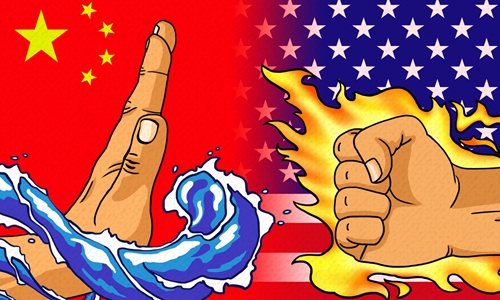China needs to prepare for continued US provocations: Global Times editorial
Source:Global Times Published: 2020/5/8 19:23:40

Photo: GT
US House Minority Leader Kevin McCarthy announced on Thursday the establishment of a Republican-led "China task force" aimed at dealing with a perceived geopolitical threat from Beijing. Increasing hostility toward China and blaming China for the Trump administration's botched response to the coronavirus epidemic have become the core campaign strategy of the Republican Party. No Democrats have participated in the task force.
The Trump government, Republican lawmakers and pro-Trump conservative media outlets recently have launched fierce attacks on China, which are apparently part of the GOP's campaign strategy. This has confused some Chinese: Is this anti-China wave specifically tailored for Trump to win re-election? Will it dissipate once the election is over? We can't be under such delusion.
Hostility against China has been spreading in the US society in recent years. The ongoing anti-China wave indeed is aimed specially at getting Trump re-elected, but it is also in line with the US ideology. It will allow hostility toward China to further simmer. The US will continue or make some adjustments to its current China policy after the election, but it is unlikely to completely change.
Regardless of whether Trump or Joe Biden is elected, the "hold China accountable" campaign will continue. It has become a way to mobilize the US society in its competition with China. Even if the Democratic Party assumes power, it too will surely clamor to "hold China accountable" as the Trump administration is doing.
China's rise is causing some US political elites to abandon rational thinking. Their basic judgment has been distorted. They exaggerate the "China threat," driven to act aggressively by a combination of anxiety and arrogance. Attacking China has gradually become the new "political correctness" in the US, which seriously affects US society's objective understanding of China-related issues.
China's system is different from that of the US. The two countries have a very different focus on many issues. But the US has a deep interest in finding fault with China based on US values. This is not simply because Americans want to attack China internationally, but because of their sense of superiority. The coronavirus epidemic has exposed the many deficiencies of the US system, but US elites remain complacent, refusing to reflect on their failures.
They are finding fault with China with a magnifying glass. A sentence by a Chinese diplomat or a word by a mainstream Chinese media outlet can quickly be overly interpreted and become a "sin" of Beijing. Meanwhile China remains quite self-constrained. The US is always the one that provokes a public opinion war between the two countries. Those with the loudest anti-China voices are the US president, secretary of state, and some US lawmakers, while on most occasions China's Foreign Ministry spokespersons and several mainstream media outlets respond to US accusations.
China needs to prepare for a long-term challenge. First, we should strengthen and enhance our core scientific technology and military strategic power. The current trend shows that the US will try to strangle China with technology export restrictions. China must stick to its bottom line and prepare for the worst-case scenario in this regard. Although the US advantage in terms of conventional military strength in China's offshore waters is dwindling, its superiority in nuclear weapons remains overwhelming, which is the biggest pillar that bolsters US military arrogance toward China. Therefore, it's an urgent task for China to expand its nuclear arsenal and strengthen its strategic strike capacities.
We must enhance our abilities to unite more countries around the world, including US allies. To this end, we should expand common interests with these countries, strive to narrow, rather than enlarge differences, and convince them that a powerful China is in their national interests and that existing differences won't hinder our respect for them.
We also need to make psychological adjustments. It has been impossible for China-US relations to return to the past, but it's still possible to avoid a Cold War-style confrontation. The Chinese people should avoid being easily irritated by US provocations, and we must have patience to strategically maneuver with the US. The US is the one that is distressed. China should respond to US provocations in a rational, powerful and restrained manner, which will best manifest China's confidence.
Chinese people have, on many occasions, needed to show great restraint. As the US often provokes China, some other countries may attempt to take the opportunity to increase their leverage in dealings with China. Under such circumstances, China needs to either make a proper response or tactfully tolerate them. Being the world's second biggest power is not easy, and sometimes not as comfortable as being a weak country that is not threatening. There is no doubt China has taken more initiative in many matters, and we should remain calm while facing various challenges in our advancement.
Posted in: EDITORIAL